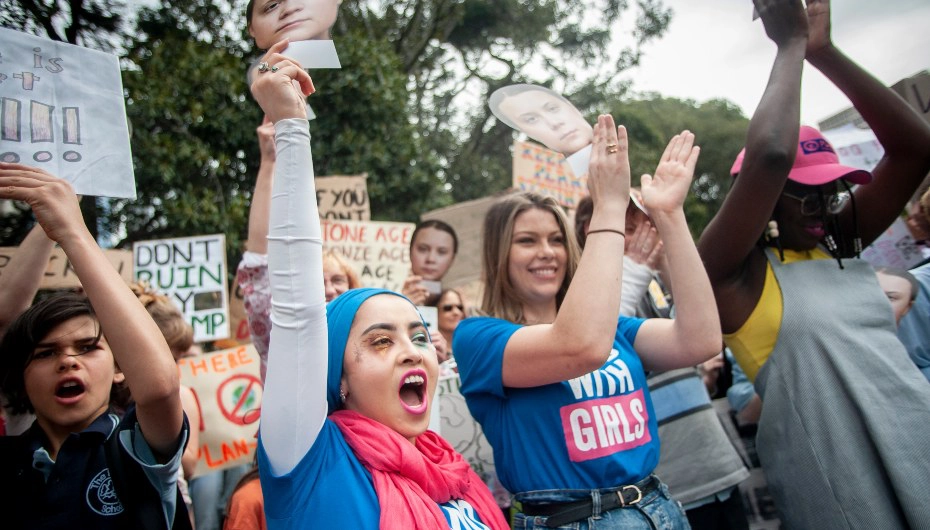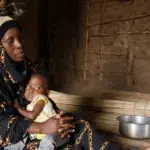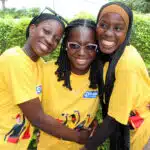Media Centre - Media release - 4 October 2022
‘Double disillusion’: New global survey finds Australia lags the world when it comes to girls and young women’s trust and participation in politics

Girls, young women and gender diverse youth across the globe consistently feel excluded from politics, according to a major new report and survey by girls’ rights charity Plan International, but Australian women feel particularly jaded, silenced and disappointed in the country’s politicians, policies and political systems.
A global survey of 29,000 girls and women aged 15-24, from 29 countries including Australia, found that respondents face significant barriers when taking part in political activities and feel poorly represented by the politicians elected to serve them. Only half (50%) believe that people in their community view it as acceptable for girls and young women to engage in political activities. One in five (19%) have personally been discouraged from doing so.
The report, called Equal Power Now: Girls, Young Women and Political Participation, is released ahead of International Day of the Girl (October 11) and is based on a survey of adolescent girls and young women from countries ranging from Indonesia, Bangladesh, Vietnam, Kenya, the USA and Brazil. In-depth interviews were also carried out with girls and young women in a further 18 countries.
Australian women and girls feel an even deeper disaffection with politics than some of their global peers with 60% of Australians surveyed disagreeing with the statement that politicians act in the best interest of girls – globally that figure was just 43%.
In another area where Australia trails the global average, more than half (53%) of the women surveyed said that the decisions of their political leaders had actually made them feel more stressed, worried or anxious. The global average for the same question was 43%.
“Australia’s migration policy scares me the most, especially through COVID-19, I was so anxious us international students would be forced to leave. As a young, non-binary, queer person who speaks up on issues that impact me, being “shipped back home” suddenly to Brunei, where I’m from, was a dangerous and scary prospect,” said Jan, a Plan International Australia youth activist living in Melbourne.
Gender norms still hold girls back as, for some of them, does the abuse and harassment that they see female politicians and activists being subjected to. From sexism and misogyny to racism, homophobia, transphobia and a lack of inclusive practices for people living with a disability, 72% of young Australian women do not feel politics is an equal or inclusive space for them, with just 1 in 10 believing Parliament was a safe workplace for them.*
“It has been a tumultuous couple of years for women in Australian politics,” said Susanne Legena, CEO of Plan International Australia. “But, even so, these results are disappointing. Australian girls feel irrelevant and disenfranchised when they should be being encouraged to take part in political discourse and the political process.
“This new report found that a clear majority of young women and girls care deeply about politics, with 97% of those surveyed agreeing that participating in politics is important and 83% saying they have personally done so. We have to do more in Australia to remove the barriers to entry and make women feel like they have a place in parliament.”
“You can’t be what you can’t see”: Diversity makes a difference
Here in Australia, girls, young women and non-binary youth have consistently told us that seeing their diversities reflected in people in decision making roles can have a profound impact on their lives – from their career choices to their education and self-belief.
In a separate survey following the May 2022 Federal Election in Australia – in which the most diverse and representative Parliament in the country’s history was voted in – 42% of young Australian women and gender diverse people aged 18-21 said this diversity made them more likely to consider a career in politics.**
“Our cultural narrative in Australia is a one of a very chill, laidback boys club, and I think that plays into a lot of young women’s disillusionment because so many young people don’t fit that narrative,” added Gracie, from Sydney.
“You’re made to feel that you’re a problem; you’re annoying if you don’t fit the mould… and I think that holds back a lot of young people, especially girls, from politics – you have been conditioned to not wanting to be seen as annoying. This definitely comes from a place of misogyny, but it also stems from a place of racism, of discrimination. Seeing more diversity in our Parliament has been a great thing – seeing people who stand out, it’s a signal to us that standing out is ok,” she added.
Still, nearly half (45%) of those who took part in the global survey think politicians in their country fail to understand their views. Amongst those who belong to an ethnic minority group, identify as LGBTQ+ or having a disability, this figure rises to 59%.
Globally, political leadership and representation remains heavily dominated by men with only one in four (26%) national parliamentarians being women and only 1% women under 30.
Of those surveyed, one in three (32%) say that they do not see any politicians that inspire them to participate in politics.
Another 40% believe that female politicians suffer abuse and intimidation and that they are judged for how they look or dress. In Australia, that percentage jumped to 57%.
“If a male leader and female leader make the same mistake, the female leader will be blamed more,” said Hang, 15, from Vietnam.
“For generations we have been sold this image…if they make me close my eyes and imagine a political person… I would have immediately thought of a man with a tie, because those are the images that are thrown at us…we don’t immediately see a woman or a young woman. So, it’s hard for people to believe that a woman, and I insist that a young woman can manage to be in these spaces. It’s a kind of behaviour that we have learnt from generation to generation,” added Aurora, 20, from Ecuador.
Despite this, a majority (56%) of girls who are of voting age in their country have voted in a local or national election and one in five (20%) say they can see themselves standing for political office in future. One in five (17%) went as far as to say they could see themselves becoming Prime Minister, President or another national leader.
“This important piece of research, which represents the views of thousands of girls and young women across countries with different cultures, income levels and civic contexts, has found that overwhelmingly, girls are political. But globally, they are still being denied the right to shape the decisions which impact their lives most,” added Ms Legena.
“Despite this, we’re seeing girls and young women redefining what it means to be political, persevering against the odds to take part in formal political processes and also championing diverse youth movements, grassroots activism and collective action. Politicians and other power holders must stand with girls, for girls, as they change the face of politics.
“It’s critical that girls and young women’s voices are heard. Critical as a right, critical to shaping the policies and decisions that shape their lives, and critical to achieving gender equality.”
[ENDS]
NOTES TO EDITORS
- Equal Power Now: Girls, Young Women and Political Participation, is released ahead of International Day of the Girl on October 11, 2022. For more information, please view the full report here.
- Data was collected from February to April 2022 by two marketing research companies, IPSOS and GeoPoll on behalf of Plan International. A total of 28,751 young women and girls took part in the survey, from 29 countries (Guinea, Kenya, Malawi, Nigeria, Togo, Zambia, Australia, Bangladesh, Indonesia, Japan, Nepal, Philippines, Vietnam, Austria, Belgium, France, Germany, Italy, Netherlands, Spain, Sweden, Switzerland, UK, Brazil, Canada, Colombia, Ecuador, Peru, USA.) In each country, except Switzerland where the target was 500, the aim was to collect responses from 1000 girls and young women aged 15-24.
* Data collected from Plan International Australia Represent Us report and polling
** Data on Australian young people’s views on politics after the 2022 Federal Election was collected from a separate YouGov poll with a politically representative national online sample of 1,039 female Australian citizens aged 18 – 24 in both city and regional areas in June 2022
Media contacts


